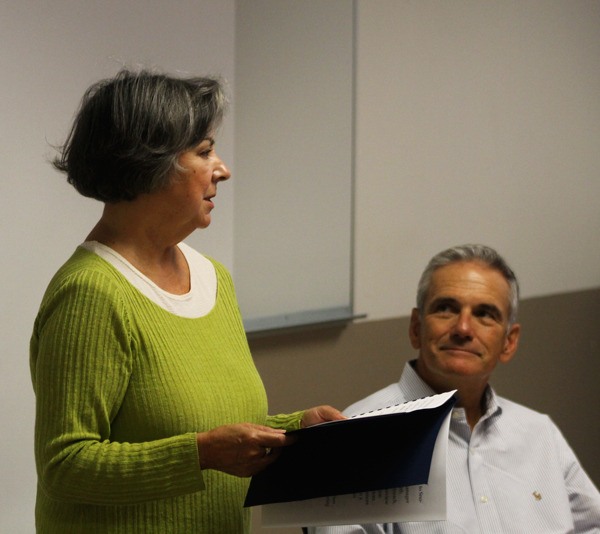Linda Beeman spent much of 2011 sleeping with her iPhone on her chest.
The sun would be up in Kabul as the moon shone over Whidbey Island; her loved one, a deployed soldier who had confessed to Beeman this war was “one too many,” was in a world she was unable to access, both physically and emotionally.
“In 2011, people on South Whidbey would often say ‘We don’t know anybody fighting these wars.’ I didn’t anticipate being the exception,” said Beeman during a reading from her book “Collateral Damage” Thursday afternoon at the Oak Harbor Library.
Beeman, an award-winning poet, Whidbey resident and friend of a soldier who confessed to Beeman he suffered from post-traumatic stres disorder, turned her stories and those of others into a book of poetry about the many facets of the conflict in Afghanistan.
The purpose of her reading, she said, was to give the audience a chance to discuss and reflect upon “uncomfortable issues.”
“The sentiment ‘we don’t know anyone’ betrayed the fact, I think, that we weren’t looking very hard,” she said.
According to Greg Stone, president of the Whidbey Veterans Resource Center board and veteran of 34 years, there are 13,000 veterans in Island County, the most veterans per capita of any county in Washington.
After Beeman’s reading, Stone gave a brief presentation outlining the data about veterans’ health concerns, benefits and options.
According to the National Center for Post Traumatic Stress Disorder, approximately 7 to 8 percent of the United States populace will experience post traumatic stress at some point in their lives. Approximately 10-18 percent of soldiers who have served in Iraq and Afghanistan are likely to develop post traumatic stress.
“There have been more suicides than battlefield fatalities in the last 13 years,” said Beeman. “We are not helping [soldiers] much, in part because we don’t know how.”
For Beeman, the war, the people involved and the consequences for veterans became personal.
While she attempted to console her friend, she said, “My messages became more demands on an overwhelmed mind. …I watched as someone I admired and then loved committed a slow motion emotional suicide. My struggles to understand his situation made me hyper-aware of the stories coming out of Afghanistan.”
To cope with the emotions these stories evoked, Beeman turned to her expressive medium of choice: poetry. Through the poems of “Collateral Damage,” Beeman discusses war on a personal level, through the eyes of individuals including soldiers like her friend and others such as Malala Yousafzai, a teenage Pakistani education activist who survived after being shot in the head by a member of the Taliban in Oct. 2012.
Both Beeman and Stone concurred that the discussion of issues such as mental health and post traumatic stress are essential to the recovery of suffering veterans, many of whom may feel ashamed to talk about their experience.
Audience members were invited to discuss the poems, war and PTSD post-reading, at which point four audience members piped up to state their own struggles, opinions and stories.
Beeman will read at the Clinton Progressive Hall at 2 p.m. Saturday, Aug. 23. “Collateral Damage” is available for purchase at the reading, with all proceeds benefiting the Whidbey Veterans Resource Center.
For more information about the Veterans Resource Center, located in the American Legion Building at Bayview, call 360-331-8081 or visit www.vetsresourcecenter.org.
Veterans Resources
Veterans and their families in Island County may utilize the Whidbey Veterans Resource Center for advocacy and referrals, basic needs such as clothing and food and a safe place to talk.
Whidbey Veteran Resource Center:
The Whidbey Veterans Resource Center is a not-for-proft organization with offices located off Highway 525 at Scott Road, Freeland, and at the American Legion Post 141, Highway 525, Langley. Call (360) 331-8081, email info@vrcwi.com or visit www.vetsresourcecenter.org for more information.
Veterans confidential crisis line: 1-800-273-8255, press 1.



